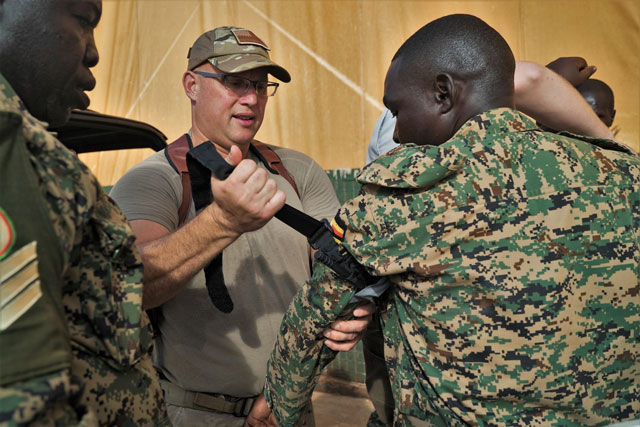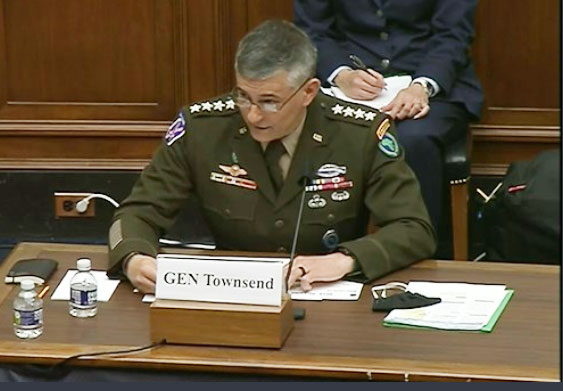
Washington, US | THE INDEPENDENT | U.S. Africa Command commander Gen. Stephen Townsend has said America can no longer afford to underestimate the economic opportunity and strategic consequence Africa embodies.
U.S. Army Gen. Stephen Townsend said this April 20 as he testified before the House Armed Services Committee as part of the command’s annual Posture Statement to Congress.
“Historically, America has not been penalized for underestimating the importance of Africa,” Townsend said during his opening remarks. “
“Today, we can no longer afford to underestimate the economic opportunity and strategic consequence Africa embodies, and which competitors like China and Russia recognize,” Gen. Townsend stressed as he discussed future threats and opportunities in Africa as well as the importance of U.S. engagement.
“Historically, America has not been penalized for underestimating the importance of Africa. Today, we can no longer afford to underestimate the economic opportunity and strategic consequence #Africa embodies, and which competitors like China and Russia recognize.” – Gen. Townsend pic.twitter.com/rTEsvJ9atS
— US AFRICOM (@USAfricaCommand) April 20, 2021
Townsend testified alongside Acting Under Secretary of Defense for Policy Amanda Dory and the U.S. Central Command commander, U.S. Marine Corps General Frank McKenzie, Jr.
During the two-hour hearing, Townsend answered questions and discussed the command’s approach to addressing regional threats, including the threat of violent extremist organizations (VEOs) such as ISIS, Al Qaeda, and Al Shabaab. He also noted the risk of not confronting these groups where they exist.
“African-based VEOs, like Al-Qaeda affiliate Al Shabaab and ISIS, thrive in the continent’s ungoverned spaces, provide the greatest threat to many of our African partners, and aspire to kill Americans in Africa as well as at home,” said Townsend.
Townsend shared with Congress a common theme during his frequent travels to the African continent.
“When I meet with African leaders, their primary concern is often VEOs killing their soldiers, kidnapping their civilians, and challenging their authority to rule,” said Townsend. “U.S. Africa Command seeks to help partners and provide the tools needed to solve some of these challenges and issues.”

While challenges exist, Townsend noted the vast opportunity and development on the African continent.
According to the International Monetary Fund, Africa is home to 13 of the world’s 25 fastest growing economies and a rapidly expanding population. Over half of the world’s arable land is on the continent, along with much of the planet’s untapped mineral resources, including strategic minerals.
Townsend also noted how Russia and China, and even Iran, are pursuing their interests in Africa.
“Our strategic competitors are very active in Africa. China has invested heavily in their ‘second continent’ or as some Chinese think tanks call it, ‘China’s 4th or 5th Island Chain,’” he said. “Russia seeks to exploit instability and fragility for their own gain and at U.S. expense. Iran is also increasingly active on the continent.”
He said that the U.S. Africa Command, with partners, counters malign actors and transnational threats, responds to crises, and strengthens security forces in order to advance U.S. national interests and promote regional security, stability, and prosperity.
He told the House Armed Services Committee that the U.S. Africa Command’s diplomacy, development, and defense model for strengthening relationships helps create conditions for African partners to build the governance and economic growth necessary to counter the influence of malign actors.
“We do this mission arm in arm with the U.S. interagency and through coordinated action with allies and partners,” said Townsend. “What AFRICOM accomplishes with a few people and a few dollars, on a continent 3-and-a-half times the size of the continental United States, is a bargain.”
***
Posture statement excerpt
Africa: Securing U.S. Interests, Preserving Strategic Options
Historically, America has not been penalized for underestimating the importance of Africa. Today, we can no longer afford to underestimate the economic opportunity and strategic consequence Africa embodies, and which competitors like China and Russia recognize.
Across this diverse continent, USAFRICOM operates with .3% of DOD’s budget and .3% of DOD’s manpower. This tiny investment pays enormous dividends as just under 6,000 service members, civilians, and contractors work with our partners, both interagency and foreign, to counter malign actors and transnational threats, respond to crises, and strengthen security forces to advance U.S. interests and promote regional security, stability, and prosperity.
AFRICOM works every day to protect America’s security and advance access and influence. We do this arm in arm with the U.S. interagency, and through coordinated action with allies and partners.
Strategic environment
The land mass of Africa is larger than the U.S., China, India, Japan, and most of Europe combined. Over half of the world’s arable land is on the continent, along with much of the planet’s untapped mineral resources,1 including strategic minerals. Africa is home to 11 of the world’s 25 fastest growing economies, as measured by gross domestic product data for 2020.2 Africa’s population is young, growing fast, and expected to top two billion in 2050, when more than a quarter of the world’s inhabitants will live on the continent. By 2100, Africa’s population could nearly double again. Not only is the continent’s growth rate the highest in the world, but the population is the youngest, with 41% under the age of 15.3 The growing size of the population, illustrates the rising global importance of the African continent and the momentum of Africa’s expanding markets.
Strategic geography
Africa has global strategic importance relative to NATO’s Southern Flank, the flow of commerce through the Red Sea, and protecting access to the Middle East, Indian Ocean, and South-East Asia. Located at the crossroads of the world, Africa watches over strategic choke points including the Strait of Gibraltar, the Strait of Sicily, the Red Sea, the Bab al Mandeb, and the Mozambique Channel. These corridors facilitate one-third of the shipping between North America and Asia, and one-third of global oil shipping. U.S. and global security depend on unhindered access to these waters.
Strategic competition
Both Beijing and Moscow have long recognized the political, military, and economic importance of Africa and each continues to seize opportunities to expand their influence across the continent. Unencumbered by international norms and standards of transparency, our competitors are able to combine both government and private resources to gain influence. Exploitative practices for trade, resource extraction, weapons sales, and debt manipulation ultimately weakens governance, slows economic growth, and fosters instability.
Strategic approach
A secure, stable, and prosperous Africa—aligned with the U.S.—is an enduring American interest. The U.S. must continue to work with our allies and partners to advance our mutual interests within the rules-based international system. Our campaign plan is focused on achieving four campaign objectives, developed and refined over the last year: 1) Gain and Maintain Strategic Access and Influence, 2) Disrupt VEO Threats to U.S. Interests, 3) Respond to Crises to Protect U.S. Interests, 4) Coordinate Action with Allies and Partners to Achieve Shared Security Objectives.
Gain and maintain strategic access and influence
U.S. Africa Command prioritizes access in key geostrategic locations to disrupt competitor efforts that threaten U.S. freedom of action and to check malign activities which exploit our African partners. While we focus our military activities in key locations, we stay engaged across the continent to maintain situational awareness, support partners and allies, and respond to emerging crises.
Disrupt violent extremist organization (VEO) threats to U.S. interests
Regional VEOs are the number one security concern for many of our partners. Access and influence stem from helping our partners with the problems they face. Shared efforts against VEOs provide the best opportunity to strengthen partnerships and to ensure the U.S. is the security partner of choice in priority countries. In Africa, counter VEO efforts are strategic competition.
Respond to crises to protect U.S. interests
As our service members operate in small groups in remote locations throughout the continent, AFRICOM is continuously adjusting our limited collection, medical, transportation, and response assets to protect our troops.
Coordinate action with allies and partners to achieve shared security objectives
U.S. Africa Command’s active participation in multi-national efforts reinforces cooperation for mutual benefit, assures partners of U.S. commitment, and denies competitors opportunities to erode U.S. influence. Enhanced relationships and military activities enable USAFRICOM to help create time and space for our African partners to build the governance and economic growth necessary to gain the capacity to repel malign actors and VEO influences.
Economy of force
A small investment in Africa goes a long, long way. What AFRICOM accomplishes with a few troops and a few dollars, on a continent 3.5 times the size of the continental United States, is a bargain for the American taxpayer. Honest assessments and prudent investments ensure the U.S. maximizes the impact of every taxpayer dollar spent to secure American interests and support allies and partners. The locations where AFRICOM resources and activities are concentrated represent the overlapping points where small teams of dedicated Americans can have outsized impacts on geo-strategic competition, protecting our personnel and homeland, and reassuring our partners and allies.
****
AFRICOM MEDIA
 The Independent Uganda: You get the Truth we Pay the Price
The Independent Uganda: You get the Truth we Pay the Price



